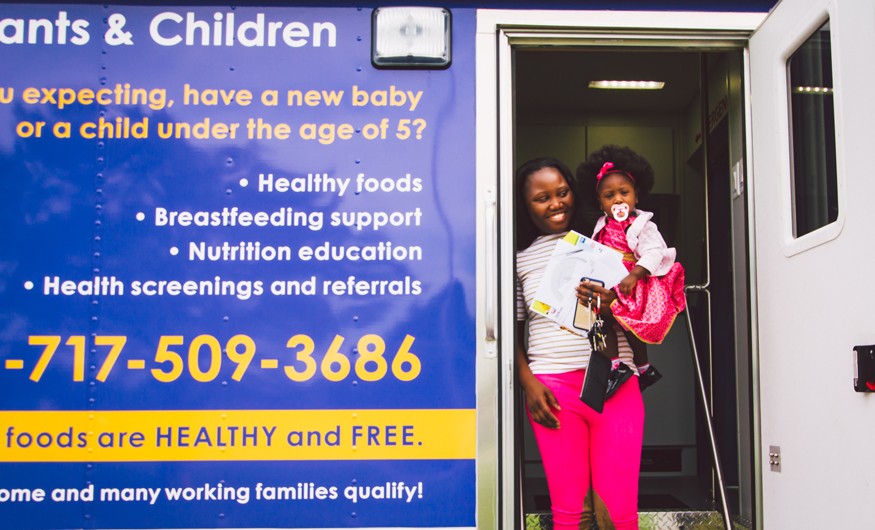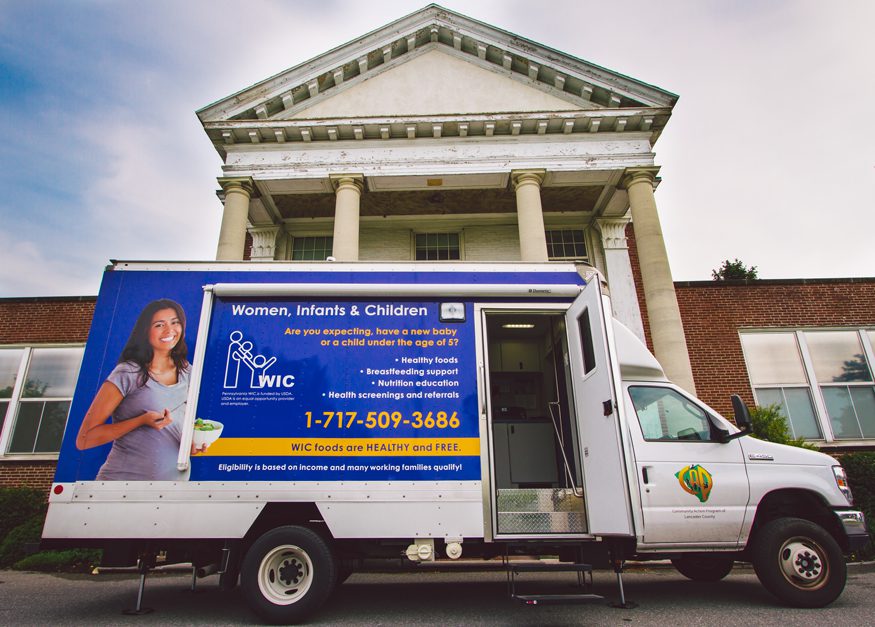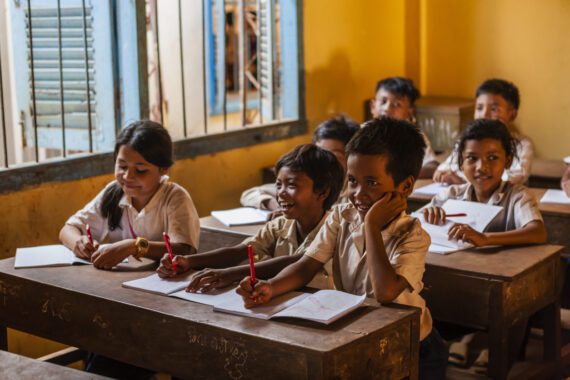Serving community — mobile clinic reaches community isolated from WIC services
By Hope Watson
Sarah,* a young mother, was faced with an incredible challenge: her nine-month-old daughter couldn’t consume solid foods — or any food, for that matter — and as a result, the child wasn’t growing adequately.
Willing to try anything, Sarah would feed her daughter new foods in the hope that her daughter’s body would finally accept some type of nourishment. Time and time again her hopes were dashed.
Enter WIC on Wheels of Lancaster, Pa., a program sponsored by the Pennsylvania Department of Health. The mobile clinic brings WIC (Special Supplemental Nutrition Program for Women, Infants, and Children) directly to communities and offers services such as healthy foods, nutrition education and healthcare referrals.
The mobile clinic has been a godsend for Sarah and her daughter. It was there that Sarah was given a voucher to purchase Elecare, a lifesaving formula for her daughter.
Sarah’s daughter has gained strength, and her sensitive stomach has become more agreeable to some foods with the help of the mobile clinic’s nutritionist.

A Community in Need
Photo: Pockets of rural areas in the greater Lancaster area have no public transportation, which makes it difficult for people to travel to the city. Joseph Terranova for Bread for the World.
Pockets of rural areas in the greater Lancaster area have no public transportation, which makes it difficult for people to travel to the city. As a result, the brick and mortar Lancaster WIC Clinic sees only a portion of the eligible population, even though a large number of residents in the county qualify for WIC services. This is worrisome given the fact that many children, infants and mothers would benefit from the services provided by the clinic. Pregnant women, new mothers, and their children up to five years of age qualify for the program based on income and the outcomes of a health screening used to tailor the nutrition counseling, breastfeeding support, and specific foods provided by WIC that are critical to a family’s well-being.
Recognizing the dilemma, clinic leadership began to put a plan in place that would bring WIC services closer to those who could benefit from them. Key areas based on the concentrations of qualifying residents in the county were identified. And in December, the research was used to establish four mobile clinic sites: New Holland, Elizabethtown, Manheim, and the Paradise/Gap areas. WIC Clinic director Kim Sullenberger said that by targeting these four areas, the Lancaster office would be able to maximize convenience for their clients and reduce the number of qualifying residents unaware of the services.
“It’s a lot easier to get a ride with someone 5 miles than 25 miles into the city of Lancaster,” Sullenberger said.
Mobile clinic client Sarah agrees. “It’s not even a mile away from where I live. It helps me out a lot,” she said. In the past nine months, the mobile clinic has served nearly 200 clients. The WIC mobile clinic not only serves a geographic need, but also the invisible need for privacy. Paustine Ronoh, the mobile clinic nutritionist, said the quaintness of the mobile unit promotes an environment of intimacy and empowers the client to “open up more.”
“We know our clients, and they know us. We build a trust,” she said.

Serving in Action
Photo: Soliah recently visited the WIC mobile clinic so her daughter could get a checkup. Joseph Terranova for Bread for the World.
The mobile clinic offers a number of services. At every visit, a family receives nutrition counseling based on a WIC health assessment. WIC is first and foremost a nutrition program, making this educational element an essential component, Sullenberger said. The assessment involves height, weight, and iron levels as well as an evaluation of dietary and family eating habits. Based on this assessment, the nutritionist is able to make expert recommendations about how to improve the family’s health through positive eating and behavior changes.
Soliah* recently visited the WIC mobile clinic so her daughter could get a checkup. “I look forward to coming to the mobile clinic with my daughter,” she said. “It’s allowed me to make sure my daughter can have regular checkups, especially because it’s not easy for us to drive the 30 minutes into the city.” (Please note that a WIC appointment is not intended to be a substitute for regular well-child checkups with a medical provider.)
Often, when Ronoh works with clients, she makes sure that they make goal setting a priority. For example, if a child is found to be drinking too much juice, she will recommend that parents set a goal of reducing the child’s beverage consumption.
Ronoh said moms come back very excited after achieving their goal and it makes them enthusiastic to set another one.
These recommendations, along with breastfeeding support, health and social program referrals, and other services are critical to the future well-being of new mothers, infants and young children. Making these services available through the mobile clinic is transformative for the families served.
“The whole idea of decentralizing service provision is taking the resources to the community instead of having the community come to us,” Sullenberger said. “And even though it’s time-consuming and more expensive, it’s really beneficial for those who are being served.”
For Ronoh, she has seen these benefits firsthand.
“This is what I’ve done for a long time, and it puts a smile on my face when the clients are happy. Especially when I work with new immigrants who are struggling with their diets when they get to America. I feel like I’ve really made a difference in their lives by providing these services,” she said.
* Name changed for privacy purposes.
Hope Watson is a former church relations intern at Bread for the World. She is currently a journalism student at the University of Missouri.

Soliah and her daughter after their visit at the WIC mobile clinic. The mobile clinic offers a number of services. At every visit, a family receives nutrition counseling based on a WIC health assessment, for example. Joseph Terranova for Bread for the World.



